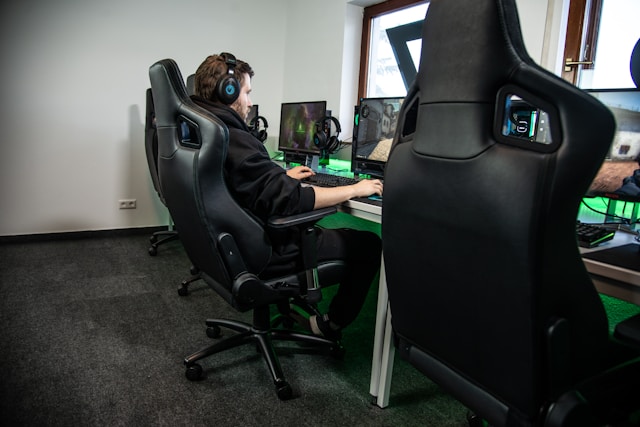Virtual Reality (VR) has added a new dimension to the online gambling industry. What was once a two-dimensional screen experience is now evolving into fully immersive, 360-degree environments where players feel present inside the game. This heightened sense of reality is no accident—it’s the result of careful scientific design, rooted in sensory perception, cognitive psychology, and real-time feedback systems.
VR immersion goes beyond high-resolution graphics or advanced sound design. It involves the human brain interpreting synthetic cues as real, which transforms gambling into a deeply engaging activity. Players don’t just play a game—they enter a casino world where physical gestures, emotional reactions, and social behaviors feel as authentic as real-life gambling.
Understanding how immersion works is crucial for both developers and users. It explains why VR gambling feels so compelling, and it reveals the psychological mechanisms that influence player behavior in this fast-developing digital frontier.
Sensory Feedback and Environmental Realism
One of the key components of VR immersion is sensory feedback. The brain processes what it sees, hears, and senses in real-time. When these inputs are well-coordinated in a VR setting, the player’s mind accepts the virtual casino as a believable space.
Visuals play a major role. In VR gambling, high-quality 3D environments, dynamic lighting, and realistic animations enhance believability. Elements like the glint of slot machine lights or the spin of a roulette wheel mimic physical cues that the brain associates with real-life casino play.
Audio is equally vital. Spatial sound allows players to hear chips clinking nearby or conversations across the room, reinforcing spatial awareness. Some systems even introduce haptic feedback—subtle vibrations in the controller or gloves that simulate touch—making actions like pulling a slot lever or placing chips feel physically real.
Together, these inputs trick the brain into perceiving the digital casino as a legitimate space, leading to deeper emotional engagement and longer playing sessions.
Presence and Psychological Engagement

In VR science, presence refers to the feeling of actually “being there” in the virtual environment. This psychological state is central to VR gambling’s impact. When players feel present in a casino setting, their decisions and behaviors mimic those they might exhibit in a real venue.
This is where cognitive engagement begins. Players interpret in-game stimuli through the lens of real-world logic: eye contact from a virtual dealer, body language from other avatars, or the weight of chips in hand can influence how they bet or react to outcomes.
Presence can also heighten emotions—joy after a win feels more rewarding, and losses may feel more personal. This emotional intensity adds to immersion but also raises important considerations around responsible gambling. The more real the experience, the more invested the player becomes, both psychologically and financially.
Game designers use this principle to build features that sustain attention, such as narrative-driven casino quests or achievement systems that tie player actions to visible progress and rewards.
Interaction and Social Immersion
VR doesn’t just replicate the look of a casino—it reconstructs the social dynamics as well. Gambling has always been a social activity, and VR enhances this by allowing real-time interactions between players and virtual staff.
Avatars in VR casinos can speak, gesture, and express themselves, turning solitary gambling into a shared experience. This level of interaction triggers social cues and behaviors that further deepen immersion.
Players can strike up conversations, celebrate wins, or even develop rivalries—all within the digital space. Social psychology tells us that humans naturally respond to group dynamics, and in VR, these interactions feel increasingly authentic.
This shared immersion fosters community building and longer engagement. Multiplayer poker rooms, tournament-style slots, and social lounges are all designed to capitalize on this dynamic, offering both gameplay and social fulfillment in one package.
Real-Time Decision Feedback

An important scientific aspect of VR immersion is real-time feedback, which links a player’s physical movements directly to the game outcome. When a player reaches out, throws dice, or flips a card, the VR system responds immediately and visually reflects the result.
This synchronous feedback strengthens the mind-body connection, reinforcing a sense of control and realism. In psychological terms, this is called agency—the feeling that your actions have meaningful consequences. In VR gambling, agency heightens player investment and makes outcomes feel earned.
Game designers fine-tune this feedback loop to sustain engagement. For instance, slow-motion effects on a winning spin or intensified lighting during a jackpot trigger the brain’s reward system. This blend of anticipation and satisfaction fuels return visits and ongoing play.
The precise timing and accuracy of these responses are key to keeping players immersed. Delays or glitches break the illusion, while seamless reactions reinforce the sense of realism.
Ethical Implications of Deep Immersion
While VR immersion enhances the gambling experience, it also introduces new ethical concerns. The same elements that increase enjoyment—realism, presence, emotional intensity—can also make it easier to lose track of time, money, or self-control.
Immersive environments may reduce a player’s awareness of risk or encourage prolonged sessions without breaks. This can lead to behaviors that resemble addiction more closely than casual recreation.
Developers and regulators must address these challenges. Features like session timers, cool-down breaks, and spending caps can help mitigate potential harm. Transparent odds, easy access to account history, and warnings during prolonged play are also important safeguards in the VR ecosystem.
As the science behind immersion becomes more refined, ethical game design will play a critical role in ensuring VR gambling remains a safe and sustainable form of entertainment.
By understanding the psychological mechanics behind VR immersion, both players and developers can better navigate this exciting and powerful shift in the future of gambling.
